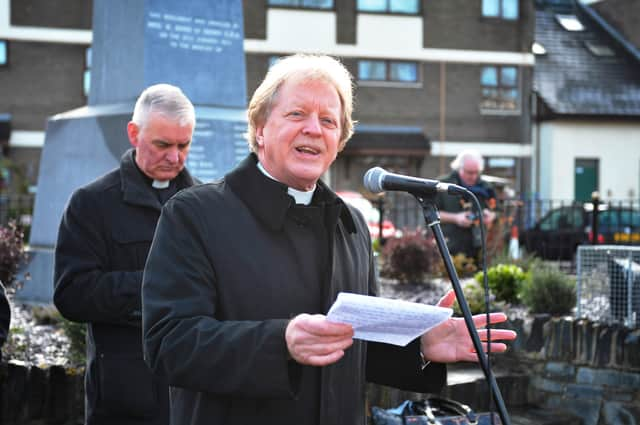Bloody Sunday 50: Relatives’ unwavering fortitude is an inspiration to ‘wounded’ everywhere


Fifty years ago, Northern Ireland’s second city seemed a long way from Dromore in Co. Down where I was born and lived, writes Rev. David Latimer.
While media reports of a civil rights march in Derry’s Bogside turning violent reached us, it has to be said it didn’t get talked about much in the small market town. A great many people, including myself, bought into the narrative promoted by Stormont, namely, that this civil rights march had been banned and all who took part were acting illegally.
Advertisement
Hide AdAdvertisement
Hide AdThe fact that twenty-seven men and youths were killed and wounded by paratroopers; that no soldiers were killed or injured by gunfire; that no guns or bombs were ever recovered, none of this suggested to us, at the time and for some years to come, that Bloody Sunday could have been an ill-conceived strategy that resulted in a “great wrong”. That’s because, back then, it was usual for Unionists to follow the Government’s line, which insisted those shot by the soldiers were gunmen.
The tide of time often brings surprising changes. In later life, living and working in Derry, I found myself not only believing the families’ story of events but standing in solidarity with them. Right from the start, the Bloody Sunday families challenged the Government’s account of what took place. Furthermore, they rejected it because deep in their hearts they knew exactly what had happened on that bleak and dark day in January 1972.
Thirty-eight years later, in May 2010, the Prime Minister’s public apology was the State finally admitting it also knew what had taken place.
Shadows of suspicion that had been allowed to linger over Bloody Sunday lifted as David Cameron announced from the House of Commons that apologising was a chance to help heal one of the worst running sores in modern history. “Nothing,” he went on to say, “could justify any of the shootings.” Little wonder ‘The New York Times’ chose to describe his statement as “extraordinary”.
Advertisement
Hide AdAdvertisement
Hide AdThat astonishing admission by the Government, however, would have remained dormant had it not been for the relentless campaigning by the Bloody Sunday families who have tirelessly toiled to discover the full truth about what happened to their loved ones
American philosopher Ralph Emerson once wrote of a people ‘who for truth and honour’s sake stand fast and suffer long’. This is a perfect fit for the Bloody Sunday families whose unwavering fortitude, across half a century, has attracted the adulation of multitudes around the world.
But their work is not yet over. Unanswered questions remain and, so, the long walk to truth and justice continues.
As another year begins, it is important to remember all who lost valued family members during The Troubles. A great many of them are also searching for answers. Perhaps the ‘Bloody Sunday Model’ can be viewed as a basis for hope and I say that because I believe every win secured by the Bloody Sunday families can be a win for wounded people in places near and far, inspiring them ‘to strive, to seek, to find and not to yield’.
Advertisement
Hide AdAdvertisement
Hide AdFifty years from Bloody Sunday, there is still more to do. That said, the job in 2022 is made easier by virtue of all who in the past stepped out onto an untrodden road.
When it feels like the road is too hard, we will recall all those who walked long ago so that we could run.
And we will not grow weary or become faint because we’re convinced it is the combined work of plain ordinary people, neither born of wealth nor privilege or of one religious tradition but of many, who will succeed in shaping our city and making it a warm and welcoming place for all.
* Rev. David Latimer is retired minister of First Derry Presbyterian Church.